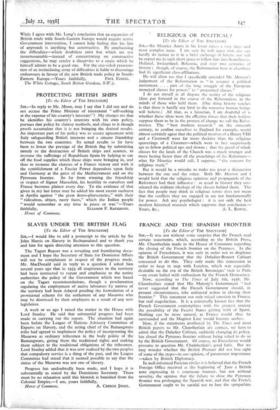RELIGIOUS OR POLITICAL ?
[To the Editor of THE SPECTATOR]
SIR,—Sir Maurice Amos in his letter raises a very large and most complex issue. I am sure he will agree that one can hardly do justice to it in a brief exchange of letters, nor will he expect me in such short space to follow him into Scandinavia, Holland, Switzerland, Bohemia, and over two centuries of history ; though, of course, the Reformation here as elsewhere had its significant class-affiliations.
He will allow too that I specifically amended Mr. Morton's judgement of the Reformation as " in essence a political movement. . . . part of the long struggle of the European moneyed classes for power," to " propertied classes."
I do not myself at all dispute the reality of the religious ideas put forward in the course of the Reformation, in the minds of those who held them. (One thing history teaches is that there is hardly any limit to the nonsense human beings will believe.) All that, as a historian, I am doubtful of is whether these ideas were the effective forces that their holders suppose them to be in the process of change we call the Refor- mation. The " best modern research " on the sixteenth century, to confine ourselves to England for example, would almost certainly agree that the political motives of a Henry VIII and a Cromwell were far more decisive than the religious quaverings of a Cranmer—which were in fact suspiciously apt to follow political ups and downs ; that the greed of whole classes for the lands of the Church was a much stronger and more lasting factor than all the preachings of the Reformers— what Sir Maurice would call, I suppose, " the concern for religious truth."
But it would be a mistake to make too great a disjunction between the one and the other. Both Mr. Morton and I would hold that the religious opinions and propaganda of the Reformers had their influence : as usual in history they con- stituted the militant ideology of the classes behind them. The fact that people may think in religious terms does not mean that the conflicts they are engaged in are not fundamentally for power. Ask any psychologist : it is not only the best modern historical research which supports that conclusion.—











































 Previous page
Previous page